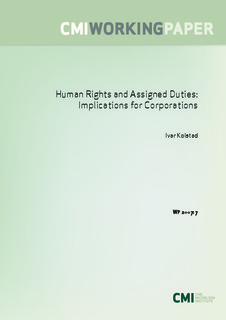| dc.description.abstract | Human rights imply duties. The question is, duties for whom? Without a welldefined scheme for assigning duties correlative to human rights, these rights remain illusory. This paper develops core elements of a general scheme of duty assignment, and studies the implications for corporations. A key distinction in such an assignment is between unconditional and conditional duties. Unconditional duties apply to every agent regardless of the conduct of others. Conditional duties reflect a division of moral labour where different tasks are assigned to specific agents, whose default activates back-up duties of other agents. Corporations face unconditional duties to not directly violate the rights of others, and not undermine the division of moral labour through practices such as tax evasion or corruption. Being unconditional, these duties cannot be deviated from by reference to the misconduct of competitors. In addition, corporate conditional duties to protect, promote or fulfil rights can be activated if the state and other designated duty-bearers fail to discharge their duties. | |
